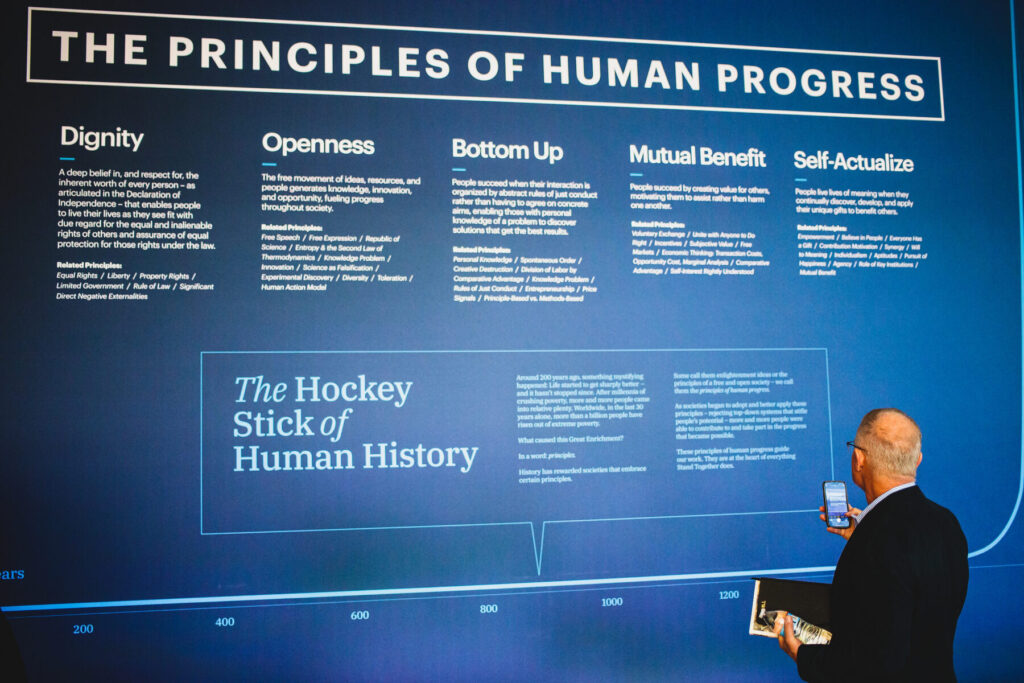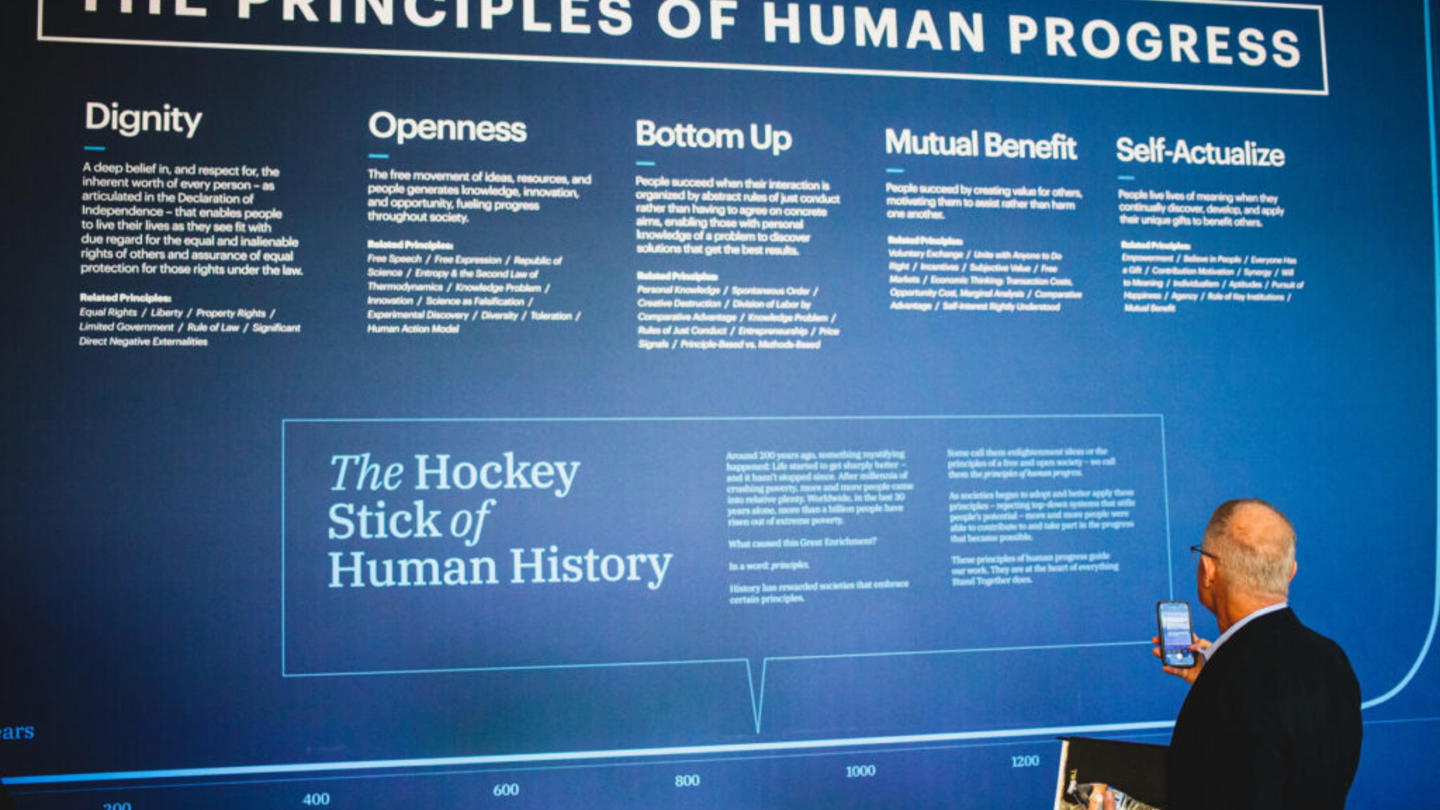By Brian Hooks
Chairman and CEO, Stand Together
Freedom, free markets, the rule of law, spontaneous order, limited government, individual liberty. These are among the list of classical liberal principles included in the material we hand out to our staff, allies, and donor partners to explain what motivates Stand Together’s thousands of investments in solving problems in our country today. Dignity, openness, mutual benefit, equal rights, free expression and other animating ideals from enlightenment thinkers like Adam Smith, John Locke, and those who continued in their tradition like Milton Friedman and James Buchanan help explain what connects our diverse set of projects to improve education, support strong communities, and pass better public policy.

Just to hit home how central these principles are to everything we do, they’re printed on a 20-foot-tall mural that runs about 70 feet wide in the lobby of the hotel ballroom where we gather the hundreds of participants who attend our semi-annual summits. These towering principles of human progress flank a graphic of what economist Deirdre McCloskey calls the “hockey stick of human history” – an indisputable illustration of the benefits they have brought to the world as countries have adopted and applied them. Just to be sure we make our point, the program booklets begin with a quote from Frederick Douglass, one of the most eloquent advocates for these principles as articulated in the Declaration of Independence: “Stand by these Principles. Be true to them on all occasions, against all foes, and at whatever cost.”
Subtle, it is not. But this is among the many facts left out of an opinion piece published in The American Mind that claims Stand Together, the organization I lead, has somehow veered away from the principles that motivated Charles Koch to found our community of business leaders, philanthropists, academics, and social entrepreneurs 20 years ago, a community that builds upon his life-long dedication and passion for applying these principles to help all people live better lives.
One of the thinkers who has had the most influence on how we’ve built Stand Together is Friedrich Hayek, the economist and philosopher who won the Nobel Prize for his groundbreaking work to understand how social order emerges in the absence of heavy-handed, top-down control.
Hayek was a keen observer of human behavior, having witnessed first-hand the destruction that comes from what he called, the “fatal conceit” – concentrated power exercised over people by those who claim to have our best interest in mind. He was also very aware that in order to check that power, the principles of a free society must enjoy the support of more than just a remnant of advocates. He urged that we must do all we can to learn and to show how these principles matter in the lives of every person. And in 1960, Hayek wrote:
If old truths are to retain their hold on men’s minds, they must be restated in the language and concepts of successive generations. What at one time are their most effective expressions gradually become so worn with use that they cease to carry a definite meaning. The underlying ideas may be as valid as ever, but the words, even when they refer to problems that are still with us, no longer convey the same conviction…and they rarely give us direct answers to the questions we are asking…[they] must be adapted to a given climate of opinion…and illustrate general principles in terms of issues with which they are concerned.
In other words, while our principles don’t change, the language we use to describe them must.
This seems to be the primary criticism of the opinion piece in The American Mind: that we don’t use the same words we used to use. The emphasis on “freedom” and “limited government” has given way, in the author’s estimation, to a focus on “empowerment” and “addressing injustice.”
Notwithstanding the above illustration where we are quite happy to use the language of freedom in very big bold letters, it is absolutely the case that Stand Together is taking Hayek’s challenge seriously. We are finding new and different ways that classical liberal principles can be applied to help people live better lives. How applying these principles empowers people to address injustices, like those visited upon people within a broken criminal justice system (which a colleague of mine aptly calls, “the best example of a failed big government program”) or in areas more familiar to those who have followed our work for a long time such as the injustice that a regulatory system captured by crony special interests visits upon an upstart entrepreneur.
The language “must be adapted,” as Hayek says and, “…illustrate general principles in terms of issues with which [people] are concerned.” And as it does, the principles become more relevant to more people.
Sign up for the Stand Together newsletter and get stories, ideas, and advice from changemakers to help you tackle America’s biggest problems.
This ability to apply time-tested principles across a wide spectrum of issues has strengthened our partnership with other groups that are part of the “liberty movement.” Indeed, Stand Together remains one of the largest supporters of these groups. And it has welcomed other organizations with whom we had not traditionally worked but who see an opportunity to make a difference through partnership, including groups who identify with the political Left.
But whether Left or Right, none of the groups we work with question whether Stand Together is committed to these foundational classical liberal principles, no matter what language we use. We wear them on our sleeve. There is no hiding the ball. We wouldn’t do it, and we couldn’t do it even if we tried.
The claims made to the contrary in this misinformed piece masquerading as concerned critique are easily shown to be false. The author claims we were afraid to condemn the violence that came from some of the protests in 2020 to avoid alienating partners on the political Left. A simple Google search reveals that we were not afraid to condemn violence and we did condemn it (here and here). He claims that we wink and nod at identity-driven ideologies such as Critical Race Theory (CRT), insinuating we have somehow compromised our commitment to methodological individualism. We have not. We have publicly argued against CRT while resisting calls to ban it, consistent with a commitment to free speech. The author asserts without any attempt to back up the claim that we have reduced our commitment to economic freedom. We have not. Today we are investing more into efforts to advance economic freedom than at any time in our history (see here, here, and here). And the teams at Americans for Prosperity are more active than they have ever been on policy issues dealing with regulation, taxes, and the need to dramatically curtail unsustainable government spending.
Many other claims in this piece are uncited and unsubstantiated, anonymously sourced, or simply asserted. And still others are just plain strange. Are there fewer pictures of Charles Koch in our office today? I have no idea.
Anyone who knows Charles Koch would laugh at the idea he is somehow playing for PR. If we were only interested in currying favor from the political Left, would we have litigated and won the most important free speech and donor privacy case to be heard by the Supreme Court in the past 10 years? Or took the lead to prevent HR1 from becoming law in the last Congress – stating clearly that this Number One legislative priority was a political power grab and not the defense of democracy politicians claimed. Hardly the easy way out.
The truth is that these are examples of efforts guided by our core principles. As are the efforts where we have stood up to power grabs on the political Right (such as here and here) or found common cause with groups on the Left (here, here, and here).
Today, there are indeed some organizations with which the author has personal familiarity that have drifted away from the principles of a free society and become fans of government control. But ours is not among them. Indeed, while the extremes on the political Left remain a clear and present danger to a system of ordered liberty, that threat has also rapidly grown among the extremes on the political Right. For an organization guided by core principles rather than political or personal ambition, the importance of showing how those principles help people live better lives, regardless of their political allegiance, is more urgent than ever.
Though this particular opinion piece is confused and inaccurate, I’m grateful to the author for the opportunity it affords to clear up any general questions about our work. So let me be clear. Stand Together is dedicated to realizing a society of equal rights and mutual benefit where people succeed by contributing to the lives of others: a free and open society that enables people to realize their potential. This can only be achieved by more fully realizing the principles responsible for progress throughout history – the principles that inspired America’s founding and that our country has been working to live up to for the past 250 years. Whenever we come closer to them, we realize how truly transformative they are – and how much more we must do to fully embody them.
We strive to do this with all comers. We believe that the problems in our society today and the threats that our country faces require putting the old divisions behind us and building diverse coalitions that will stand up for what must be done. We will unite with anyone to do right. Our common cause is to support the only country in the history of the world motivated by a deep belief in a free peoples’ ability to discover and bring about new and better ways for people to live together in peace and prosperity. And we know the only way to do it is by applying those time-tested principles of human progress.
Stand Together partners with changemakers tackling the root causes of America’s biggest problems.
Learn more about Stand Together’s priority issues, and explore ways you can partner with us.

Eleven photos show how NBA stars and leaders transformed a school and inspired seven Bay Area entrepreneurs.

You don’t have to be a pro athlete to put their lessons to work in your own community.

AI can be used to prevent wrongful incarceration, offer mental health access to millions, and gamify daily wellness.

Watch these professional football players highlight what matters most to them off the field.
